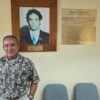
BC Cook
AROUND one hundred people live in the village of Adara, on the backside of Atauro Island. It is a small piece of land near East Timor. Times used to be good on Atauro. Rainfall came in abundance, which in turn allowed farming and livestock grazing. Many people engaged in bringing forth food from what the land provided.
But when the climate shifted and the rains came less and less frequently, the land could not support the bounty it once did. Crops grew increasingly meager until they failed completely. When the grasses stopped growing, livestock had no food source, so the herds shrank until it was no longer viable to keep animals. The land around Adara became a desert wasteland for miles in every direction. They faced a decision. The people either had to find another way to provide food for their families or they had to leave the island.
It was then that a group of women took to the sea. The men in the village had already been fishing for as long as anyone remembers. Fathers taught their sons how to build small fishing boats, weave nets, make hooks, and seek sustenance in the deeper waters around the island. The women had another idea.
They fashioned goggles and spears and swam the lagoon in search of reef fish. And they found them in abundance. Scientists estimate that over 300 species of reef fish live near Adara, and with a drop-off of several kilometers just a few hundred yards from the shore, the stocks are constantly replenished as nutrients well up from the deep. It is a bountiful, although not inexhaustible, pantry.
There are about eight to 12 women in the group, ranging in age from eight years old to one we guess is around 60, though we did not ask and she did not offer. They don their goggles and masks most days and spend a few hours spearfishing. Then they lounge in the sand for a while to bring their body temperatures back up before cleaning the fish and laying the filets out to dry. On the weekend, they walk the seven kilometers to the island market and sell the surplus of their catch, using the money to buy clothes or other food items to add variety to their diet. In this way, everyone on the island has the chance to eat something different.
The men in Adara do not mind the new role for the women. Most of them are proud of what they are doing. The men fish from boats for larger creatures in deeper water while the women swim for reef fish. As long as one group has a good day, everyone wins. If both groups have a good day, there will be more surplus to sell at the market and maybe everyone will get a new shirt this week.
There are lessons from Adara for the rest of us. We find ourselves in the middle of environmental change which we will have to adapt to if we want to survive. Old ways of doing things may not be sufficient, old lifestyles may not be practical soon. Like the women divers of Adara village, will we have the courage to adapt, to “take to the sea” in whatever form that may take? The women say they are happier than they ever were. The original women divers, the ones who took to the sea first, are still alive and they say the positives have far outweighed the negatives of their new lifestyle. It sure is food for thought.
BC Cook, PhD lived on Saipan and has taught history for over 30 years. He is a director and historian at Sealark Exploration (sealarkexploration.org)











